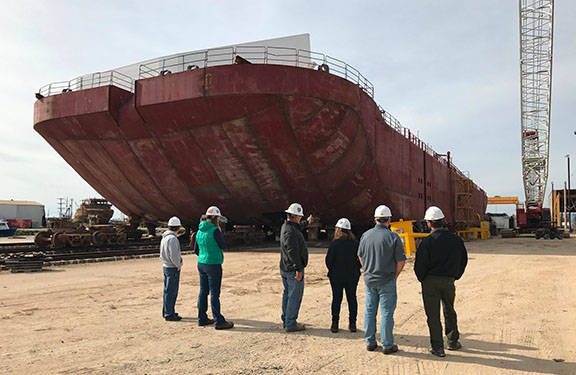In 2017, Alyeska Pipeline Service Company marked 40 years of operating the Trans Alaska Pipeline System. And thanks to strong efforts by North Slope producers, 2017 also marked the second annual increase in TAPS throughput since 2002. Every new year brings new opportunities, new challenges, new milestones to accomplish. And in 2018, Alyeska will continue moving North Slope crude safely every day while focusing on another major landmark: this summer’s transition of our marine services provider for Prince William Sound operations from Crowley Maritime to Edison Chouest Offshore (ECO).
I want to update you on our progress and share our enthusiasm about this transition. Even six months out, much preparation is underway. While this is a change in a complex business arrangement, it is much more than that. The marine services contract is one of Alyeska’s most important and sensitive — our marine contractor works with Alyeska’s people and stakeholders to prevent and, if needed, respond to marine incidents or spills. They help us protect Prince William Sound and Port Valdez marine environment, resources and communities. They become our partner in delivering excellence and maintaining trust with our stakeholders.
Every one of our employees understand this accountability. Alyeska’s Valdez staff doesn’t just work here. Many are from families that have fished and recreated in these waters for generations. This gives us a strong sense of stewardship. ECO will soon share this responsibility.
ECO and its people also share Alyeska’s passion for our respective work and commitment to safety and innovation. ECO’s experienced crews work in Arctic and Antarctic waters, the North Sea, Africa and other demanding locations. They service private companies and specialized U.S. government missions. It was clear from the start of our partnership that ECO’s people take great pride in their 50-plus-year marine operations legacy, and embody the sailor grit, commitment to safe operations, and operational excellence that grounds our own #TAPSPride.
Brand new, fit-for-purpose escort and general purpose tugs, along with response barges, are being built for this contract. Unlike the current fleet, the new tugs have increased power, better towing equipment and electronics, and more. The barges have clean decks specifically designed to operate a new, more efficient type of skimmer. All will be U.S. Coast Guard classed and American Bureau of Shipping certified.
The transition will not be one fleet leaving port as another arrives. ECO personnel are already training for Prince William Sound operations. In October, the first group of experienced ECO mariners began learning about the specifics of the Alyeska Ship Escort/Response Vessel System (SERVS) mission in Prince William Sound, training in ECO’s state-of-the-art ship simulator, and getting hands-on experience with SERVS equipment. ECO captains have also been riding Prince William Sound waves on escorts crewed by our longtime marine services partner, Crowley. This training tempo will increase as the actual transition approaches and as vessels and crews arrive in Port Valdez.
Fourteen tugs and barges are in various stages of completion. Five vessels — two escort tugs, a general purpose tug and two barges — have already launched. By March, residents of Prince William Sound will see the first of each class of vessel arrive in their backyard: The escort tug Commander, the general purpose tug Elrington, and the oil spill response barge OSRB-1. In preparation, ECO is building personnel housing and a new office/warehouse facility in Valdez. By summer, five new escort tugs, four new general purpose tugs and four new barges will be in Valdez, as well. ECO is also bringing an existing large anchor-handling tug. They join a familiar nearshore response barge that ECO is buying from Crowley, some smaller barges, and other equipment like a self-propelled skimmer, the Valdez Star.
A broad range of stakeholders are making this journey with us. Alyeska staff dedicated to the transition regularly tour ECO’s training facilities, shipyards and construction centers in Louisiana, Mississippi and Oregon to monitor progress. We often bring guests so they can experience firsthand the commitment and competencies of ECO, its vessels and its people.
ECO also gets to hear directly from our neighbors about their concerns and lifestyles in Prince William Sound. We’ve been joined by Prince William Sound fishermen and residents, the Southwest Alaska Pilots Association, members of the PWS Regional Citizens’ Advisory Council and local, state and federal officials from Alaska and beyond. The Alaska Department of Environmental Conservation and U.S. Coast Guard are closely involved, too, ensuring standards of equipment performance, testing and training are satisfied. And Crowley remains fully committed to a smooth and effective transition.
I find this entire process remarkable. I am excited by the craftsmanship and capabilities of the new vessels, and meeting the talented ECO leadership, crews and staff. I appreciate our partnership with TAPS trade tanker operators, the thoughtful and methodical planning and execution of the transition by a fully engaged staff, open conversations with regulators and stakeholders, and a wholehearted investment of time and energy by many people. All know we need a smooth and safe turnover.
And all share with me the anticipation of knowing that when this transition is accomplished, we will welcome a new fleet of amazing ships and their capable crews to Prince William Sound. At that time, we will enjoy the great satisfaction that comes from knowing we have substantially improved prevention and response capabilities for marine operations in Prince William Sound for many years to come.
• Tom Barrett is a retired U.S. Coast Guard vice admiral, former Deputy Secretary of the U. S. Department of Transportation and President of Alyeska Pipeline Service Company. My Turns and Letters to the Editor represent the view of the author, not the view of the Juneau Empire.

